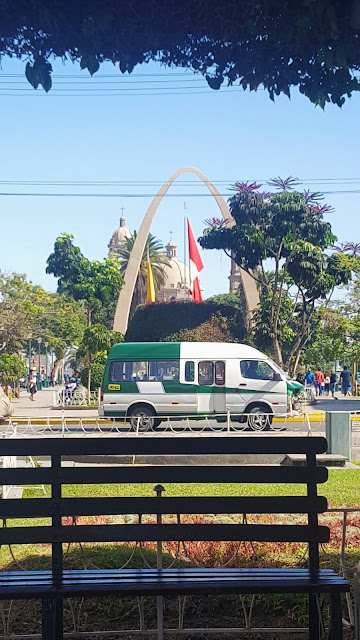A Gringa's Survival Guide to Public Transportation
 Everyone in Tacna uses the bus from high-up businessmen, to frail abuelitas, to awkward teenagers. You pack all passengers in as tightly as possible, sardines in a can, and inexplicably, in spite of so many bodies, the bus ride can often becomes a game of Graveyard, everyone staying as quiet as they can. Of course there’s always the rogue passenger who decides it’s their turn to blast their Youtube video from their phone at full volume, but for the most part, buses are a moment in which we stop talking for a little while, and just sit. This human silence may seem especially jarring in a city where there is always noise, when there is always an old vehicle rumbling by or a child crying. But the act of sitting together opens the door for something new, something intimate that we have little access to in the busy-ness of the city.
Everyone in Tacna uses the bus from high-up businessmen, to frail abuelitas, to awkward teenagers. You pack all passengers in as tightly as possible, sardines in a can, and inexplicably, in spite of so many bodies, the bus ride can often becomes a game of Graveyard, everyone staying as quiet as they can. Of course there’s always the rogue passenger who decides it’s their turn to blast their Youtube video from their phone at full volume, but for the most part, buses are a moment in which we stop talking for a little while, and just sit. This human silence may seem especially jarring in a city where there is always noise, when there is always an old vehicle rumbling by or a child crying. But the act of sitting together opens the door for something new, something intimate that we have little access to in the busy-ness of the city.
In these moments of quiet, I take a moment to look around at the people around me. It’s a wonderful opportunity to unashamedly people-watch; a strange mix of personal, intimate moments with complete strangers. Something stirs in my heart when I see a mother who has been working since 4 a.m. with her son in her lap, falling asleep as the bus jolts along; when I meet the eyes of a small toddler who’s never seen a foreign face quite like mine; or watch two high school students in the back of the bus attempting a subtle romance and failing to do so (more likely they simply don’t care). I get to see life in Tacna as it is, in its purest form.
I understand when my time as a volunteer ends I may feel the pull to return to having my own personal vehicle. I may rationalize and make excuses about efficiency or independence. However, I hope and pray that I never forget the peace in my soul as I watch the afternoon sun clear the dust away, towering mountains and sand dunes revealing themselves in the distance. I want to recall these early evenings when the setting sun illuminates the street markets as the vendors hawk the last of their produce for the day. I want to remember rose-gold light transforming dirt roads into breathtaking, wide-open expanses. These moments only ever experienced from the windows of Tacna buses. There really is no better way to know a city.
The following is this gringa’s Survival Guide to Public Transportation in Tacna.
 |
| My usual side-of-the-road bus stop. |
Prices: Prices for the buses are never actually
what is stated on the signs. When I arrived all signs said 80 cents (about 25 cents of a dollar) but buses
only charged 70. After the bus strikes a few months ago, the signs went up to 1
sol but bus drivers only charge 80 cents now. And that’s only in Tacna. If I
hop over to Arequipa or make my way to Lima, the prices for different bus lines
are always a surprise. Sometimes I’ll be charged the price of a college
student. Sometimes, the price of a foreigner (which is not a legitimate price,
cobradores just try and get a few more cents out of you).
Schedule: There is no actual schedule but usually
a bus will pass by every fifteen minutes.
Except for Sundays. If you live in Habitat or
somewhere else further outside the city, expect to wait on that street corner
in the hot sun for a while longer because most drivers take their buses to the
beach where they can get more customers on the weekend.
 |
| Observing the culprit. |
The most common reason for being late to work is
“the bus just never showed up”— which may or may not be true but is considered
a perfectly legitimate excuse. I have to confess that I have used this
technique more than once.



Or "Me dejó el bus!"
ReplyDelete